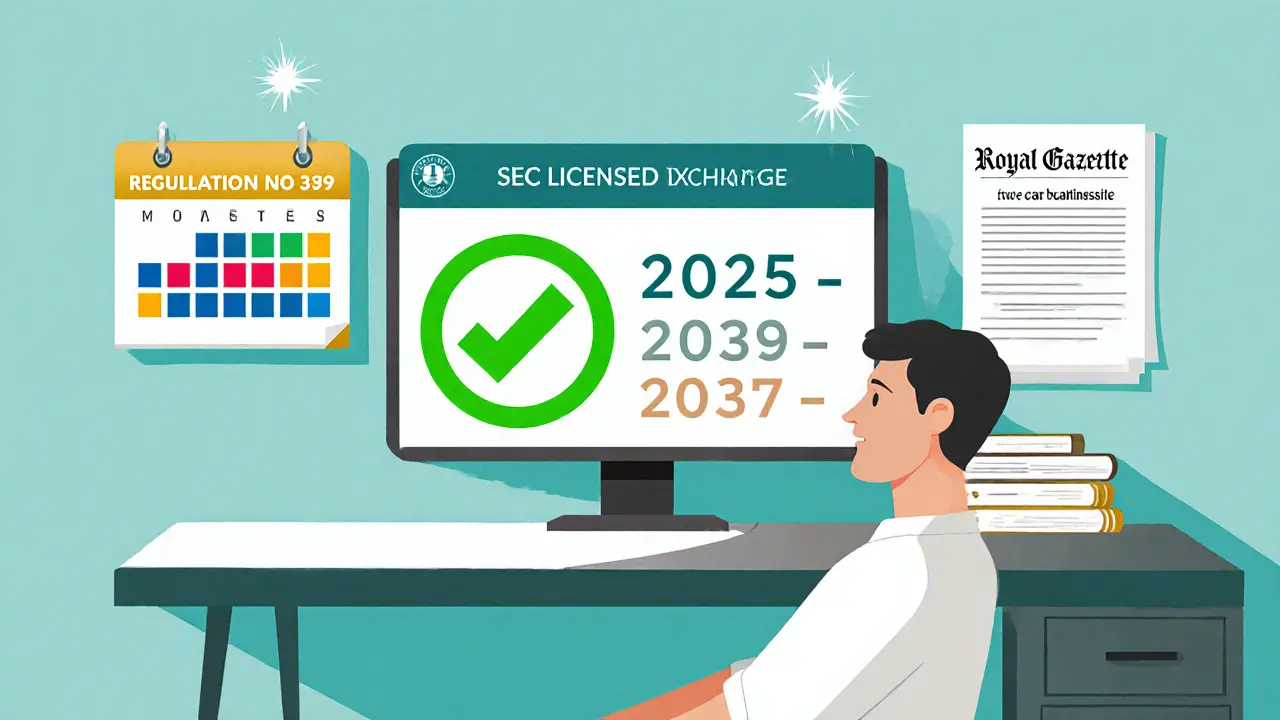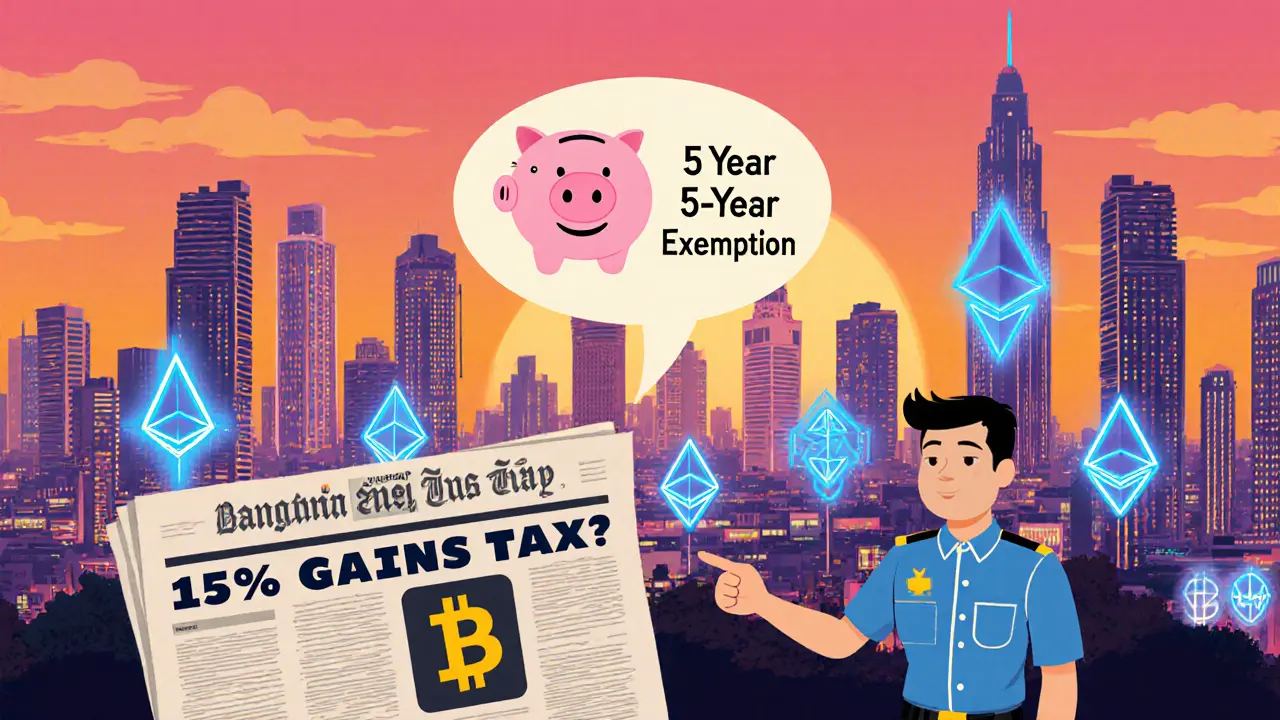Thailand Crypto Tax Calculator 2025
Calculate Your Tax Liability
Enter details above to calculate your tax liability
How This Works
Based on Thailand's 2025 tax regulations:
-
Thailand residents get 5-year exemption on gains from SEC-licensed exchanges (2025-2029)
-
Foreign entities face 15% withholding tax on crypto income sourced in Thailand
-
P2P, DeFi, staking, lending remain taxable at 0-35% ordinary income rates
When it comes to Thailand cryptocurrency tax the rules that apply to crypto gains have shifted dramatically in 2025, many investors still hear the headline “15% gains tax” and wonder if it still bites. The reality is a blend of a sweeping five‑year capital‑gains exemption and a narrow 15% withholding tax that only hits foreign‑registered entities. Below we break down what’s actually taxable, where the exemption applies, and how you can stay compliant while taking advantage of Thailand’s “Digital Asset Hub” push.
What the 5‑Year Tax Exemption Actually Covers
Ministerial Regulation No. 399 (B.E. 2568), published in the Royal Gazette on September 5, 2025, introduced a five‑year personal income tax exemption for crypto capital gains. The exemption runs from January 1, 2025, to December 31, 2029, and applies only when the sale or transfer happens through a SEC‑licensed exchange or a broker approved under the Digital Asset Business Decree. If you meet those conditions, the profit is treated as tax‑free personal income.
- Only capital gains from qualifying platforms qualify for exemption.
- Both spot‑trading profits and token‑swap gains are covered, provided the exchange holds a Thai SEC license.
- Losses incurred on exempt transactions can be used to offset other capital gains within the same year.
The exemption was championed by Deputy Finance Minister Julapun Amornvivat, who described it as a “key step in boosting Thailand’s economic potential.” The government projects that the policy will stimulate roughly $1billion in annual revenue through increased market activity, even though the tax is technically eliminated for those qualified gains.
Who Still Faces the 15% Withholding Tax
While residents can dodge capital‑gains tax on qualified trades, a separate 15% withholding tax still applies to foreign entities earning crypto income in Thailand. This tax is levied at the source on payments made to non‑resident companies or individuals and is unrelated to the personal‑income exemption.
Key points:
- The 15% rate does not affect Thai residents trading on local, licensed platforms.
- Foreign exchanges, offshore custodians, or any non‑Thai‑registered entity that derives crypto revenue from Thai sources must withhold 15% before paying out.
- Failure to withhold correctly can trigger penalties from the Thai Revenue Department.
In practice, the withholding tax mainly concerns overseas exchanges that wish to serve Thai customers or international businesses that earn royalties, fees, or interest from Thai‑based crypto projects.
Eligibility Requirements - Licensed Exchanges Only
To qualify for the exemption, your transactions must happen on platforms that hold a license from the Thai Securities and Exchange Commission (SEC). The SEC maintains a public register of approved digital‑asset businesses, and the list is updated quarterly.
Transactions that fall outside this scope-such as peer‑to‑peer (P2P) sales, decentralized exchange (DEX) swaps, or trades on unregistered foreign exchanges-remain fully taxable under ordinary personal‑income rules, with rates ranging from 0% to 35% depending on your total annual income.
Similarly, income streams like staking rewards, crypto‑lending interest, and derivatives trading are not covered by the exemption and should be reported as ordinary income.

How to Report and Keep Records
Even though the exemption removes the tax liability on qualified gains, the Revenue Department still requires you to disclose the transactions on your annual personal‑income tax return (Form PT-40). The reporting steps are:
- Gather CSV or Excel statements from your SEC‑licensed exchange for the tax year.
- Separate exempt gains from taxable activities (e.g., P2P sales, staking).
- Calculate net profit or loss for each category.
- Enter the exempt amount in the “Tax‑exempt capital gains” field; report taxable items in the regular income sections.
- Attach a summary sheet showing exchange‑license numbers and transaction IDs as supporting documentation.
Keeping detailed records is essential because the exemption can be challenged if the Revenue Department suspects you used an unlicensed platform or failed to separate income streams correctly.
Tax‑Planning Tips for Thai Crypto Investors
Because the exemption only covers trades on licensed platforms, a smart strategy is to funnel the bulk of your activity through those exchanges. Here are three practical tactics:
- Consolidate trades. Instead of scattering purchases across multiple foreign exchanges, move your funds to a single Thai‑licensed venue before selling. This maximizes the exempt portion of your gains.
- Time your sales. If you anticipate a market dip, consider realizing losses on non‑exempt activities (e.g., P2P sales) to offset gains from exempt trades later in the year.
- Tax‑loss harvesting. Even though exempt gains are tax‑free, the Revenue Department still allows you to carry forward losses from taxable activities to reduce future ordinary‑income tax.
Remember, the exemption does not eliminate the need for bookkeeping; you must still demonstrate that each profit came from a qualifying exchange.
Future Outlook - What Happens After 2029?
The five‑year window was designed to give the government time to assess market impact. The Ministry of Finance has said it will review the policy in 2029 and may either extend the exemption, tighten the eligibility criteria, or introduce a modest capital‑gains tax rate.
Potential scenarios include:
- Extension of the exemption with a higher threshold for taxable income.
- Introduction of a flat 10% capital‑gains tax on all crypto profits, regardless of exchange licensing.
- Greater enforcement on DeFi activities, requiring Thai users to register with the SEC to claim the exemption.
Staying informed about regulatory updates is crucial. Follow the SEC’s announcements and watch for any new ministerial regulations published in the Royal Gazette.

Quick Reference Table
| Aspect | 5‑Year Exemption (2025‑2029) | 15% Withholding Tax |
|---|---|---|
| Who it applies to | Thai residents trading on SEC‑licensed exchanges | Foreign entities earning crypto income sourced in Thailand |
| Tax rate | 0% on qualifying capital gains | 15% withheld at source |
| Transaction types covered | Spot trades, token swaps on licensed platforms | All crypto‑related payments to non‑residents |
| Excluded activities | P2P sales, DeFi swaps, staking, lending income | N/A (applies regardless of activity) |
| Reporting requirement | Declare on personal‑income return (exempt field) | Withholding reported by payer; foreign entity files final tax |
| Duration | January12025-December312029 | Ongoing until policy change |
Key Takeaways
The headline “15% gains tax” only tells half the story. For Thai residents using SEC‑licensed exchanges, the new five‑year exemption means zero tax on qualifying crypto profits. However, any activity outside licensed platforms-or income earned by foreign entities-still faces taxation, either through ordinary rates or the 15% withholding rule. Accurate record‑keeping, careful platform selection, and proactive tax planning can help you stay compliant and make the most of Thailand’s crypto‑friendly stance.
Frequently Asked Questions
Do I need to pay any tax on crypto gains if I trade on a Thai‑licensed exchange?
No. Under Ministerial Regulation No.399, capital gains from qualified trades on SEC‑licensed platforms are fully exempt from personal income tax for the 2025‑2029 period.
What happens to gains from peer‑to‑peer sales?
P2P transactions are not covered by the exemption. They are taxed as ordinary income at rates ranging from 0% to 35% based on your total yearly income.
Is staking income taxable?
Current guidance treats staking rewards as ordinary income, subject to the regular personal‑income tax scale. The exemption does not apply.
Can a foreign exchange avoid the 15% withholding tax?
Only if the exchange establishes a Thai subsidiary that obtains an SEC license; otherwise the 15% withholding applies to payments made to the foreign entity.
When will the government review the exemption?
The policy is set to be reviewed at the end of 2029. The Ministry of Finance will assess market impact and may extend, modify, or replace the exemption.

Hailey M.
August 8, 2025 AT 00:19Whew, the Thai tax code just pulled a 2025 plot twist-a five‑year tax‑free honeymoon and a sneaky 15% ghost for foreigners 😅. If you’re trading on a SEC‑licensed exchange, you can practically celebrate every bull run without a tax bill 😎. But don’t get too comfy; the exemption’s a moving target, and the government still wants receipts on the side. Meanwhile, offshore platforms are sweating into the 15% vat like they’re buying a ticket to the party. Bottom line: pick the right playground and keep those records tidy, or you’ll be the next headline.
Schuyler Whetstone
August 19, 2025 AT 14:05Yo, Thailand thinks they’re being all “crypto‑friendly” but it’s just a lame stunt to trap the clueless. They give you a five‑year “free ride” on licensed exchanges then slap a 15% tax on anyone who isn’t Thai – classic double‑standard. If you’re not on a SEC‑licensed platform you’re basically a tax‑evader in their eyes, so don’t be an idiot and go rogue. This whole thing reeks of government greed, and the fine‑print is just a way to keep the cash flowing to the state. Stop believing the hype and read the fine‑print, dumbasses.
David Moss
August 31, 2025 AT 03:52It’s obvious that the 5‑year exemption is just a smokescreen-the real agenda is to funnel crypto traffic into state‑approved exchanges, creating a data trap for the ministry. You may think the 15% withholding is harmless, but it’s a back‑door for the government to monitor every foreign transaction, a classic surveillance play. The timing aligns perfectly with the new digital‑asset decree, which coincidentally grants the SEC unprecedented powers. This isn’t about tax fairness; it’s about control – a subtle yet powerful mechanism to keep the crypto crowd in check.
Pierce O'Donnell
September 11, 2025 AT 17:39I’m not buying the hype about the exemption.
Vinoth Raja
September 23, 2025 AT 07:25From a regulatory‑compliance perspective, the Thai framework essentially bifurcates the crypto ecosystem into a “white‑list” of SEC‑licensed venues and a “grey‑zone” where traditional income‑tax rates apply. This dichotomy forces market participants to optimize their operational topology-either migrate liquidity to licensed exchanges or restructure earnings to qualify as non‑taxable capital gains. The withholding mechanism, meanwhile, acts as a source‑based tax extraction point for cross‑border entities, aligning with OECD‑style principles of source taxation. Practically, you’ll want to conduct a cost‑benefit analysis on transaction latency, custody solutions, and audit trails to ensure compliance without sacrificing yield. In short, the exemption is a strategic instrument to channel volume through regulated conduits while preserving a fiscal lever on foreign inflows.
Kaitlyn Zimmerman
October 4, 2025 AT 21:12First off, congratulations on navigating the Thai crypto tax maze-it’s a lot more complicated than it looks at first glance. The five‑year exemption applies only if every trade lands on an exchange that holds a current SEC license, so your first task is to verify the licensing status on the official SEC registry. Once you’ve nailed down a compliant platform, download the full CSV statement for the fiscal year; most exchanges now offer a “download all trades” button that includes timestamps, trade IDs, and the net P&L in Thai Baht. Next, separate those rows into two buckets: exempt trades (the ones that occurred on the licensed exchange) and taxable trades (P2P sales, DeFi swaps, staking rewards, etc.). For the exempt bucket, calculate the gross profit‑minus‑cost and you can safely enter that figure into the “Tax‑exempt capital gains” line on Form PT‑40. For the taxable bucket, you’ll need to convert any foreign‑currency amounts into Baht using the THB/USD rate on the trade date, then sum them up to determine your ordinary income subject to the progressive scale. Don’t forget to include any crypto‑interest or lending income in the same taxable bucket, as the exemption does not cover those streams. After you’ve got the numbers, prepare a concise summary sheet that lists the exchange’s license number, the total exempt profit, and the total taxable profit, and attach it as an annex to your return. It’s also wise to keep the original CSV files and any supporting screenshots for at least five years, because the Revenue Department can request audit evidence at any time. If you’re using multiple licensed exchanges, repeat the verification and aggregation steps for each, then combine the exempt totals before reporting. For any losses you incur on taxable activities, you can carry them forward for up to three years to offset future ordinary income, a useful tool for tax‑loss harvesting. Should you be unsure whether a specific activity falls under the exemption, err on the side of reporting it as taxable-the penalty for under‑reporting far outweighs the extra paperwork. Finally, keep an eye on the official Royal Gazette and SEC announcements; any changes to the licensing list or the exemption timeline will affect your filing obligations. By staying organized and proactive, you’ll not only stay compliant but also maximize the benefit of Thailand’s crypto‑friendly policies during this five‑year window.
DeAnna Brown
October 16, 2025 AT 10:59Oh, look at you, already mastering the whole “download‑CSV‑and‑file‑it” dance-like you’ve been doing this since 2020! I hate to burst your bubble, but the real secret sauce is the timing of your loss‑harvesting; you have to sync those taxable losses with the peak of your exempt gains to keep the overall tax bill at zero. And don’t even think about ignoring staking on a licensed exchange; the tax man will sniff that out and ding you anyway. Trust me, I’ve seen more than a few newbies get caught because they assumed “exchange‑licensed = everything’s free.” Stay sharp, keep those records pristine, and you’ll ride this exemption like a pro.
Chris Morano
October 27, 2025 AT 23:45True, the devil is in the details, especially when it comes to consolidating trades across multiple platforms. Keeping a tidy spreadsheet and setting reminders for annual filing can make the whole process feel less daunting. It’s great to see the community pointing out these nuances-together we can all stay compliant and make the most of the exemption.
Ikenna Okonkwo
November 8, 2025 AT 13:32What Kaitlyn laid out is a solid roadmap, and I’d add that leveraging a crypto‑tax software can automate the CSV parsing and classification steps, reducing manual errors. While the exemption is generous, it’s still wise to run a scenario analysis on how future regulatory tweaks might affect your net after‑tax returns, especially as 2029 approaches.
Laura Hoch
November 20, 2025 AT 03:19Let’s cut the fluff-if you’re not obsessively tracking every trade on a licensed exchange, you’re basically inviting the taxman to raid your wallet. The exemption is a golden ticket, but it turns to ash the moment you slip a P2P deal into the mix without proper reporting. Keep your ledgers razor‑sharp, or you’ll be paying penalties that dwarf any potential gain.
Devi Jaga
December 1, 2025 AT 17:05Yeah, because the Thai government is totally benevolent and just wants to hand out tax‑free crypto gains to anyone who follows a spreadsheet tutorial. In reality, this “exemption” is a smokescreen to push investors into a handful of state‑approved exchanges, consolidating control while pretending to be crypto‑friendly.
Jason Zila
December 13, 2025 AT 06:52It’s fascinating how the regulatory split forces traders to re‑engineer their whole strategy, essentially turning exchange selection into a core component of portfolio construction.
Sara Stewart
December 24, 2025 AT 20:39While I get the frustration with the double‑standard, we also have to acknowledge that the exemption does give Thai residents a real advantage if they commit to licensed venues. Let’s work together to share verified exchange lists so the community isn’t left guessing.
Jessica Cadis
January 5, 2026 AT 10:25Sharing resources is fine, but don’t pretend the system isn’t biased-the tax code still favors those with the means to navigate it.